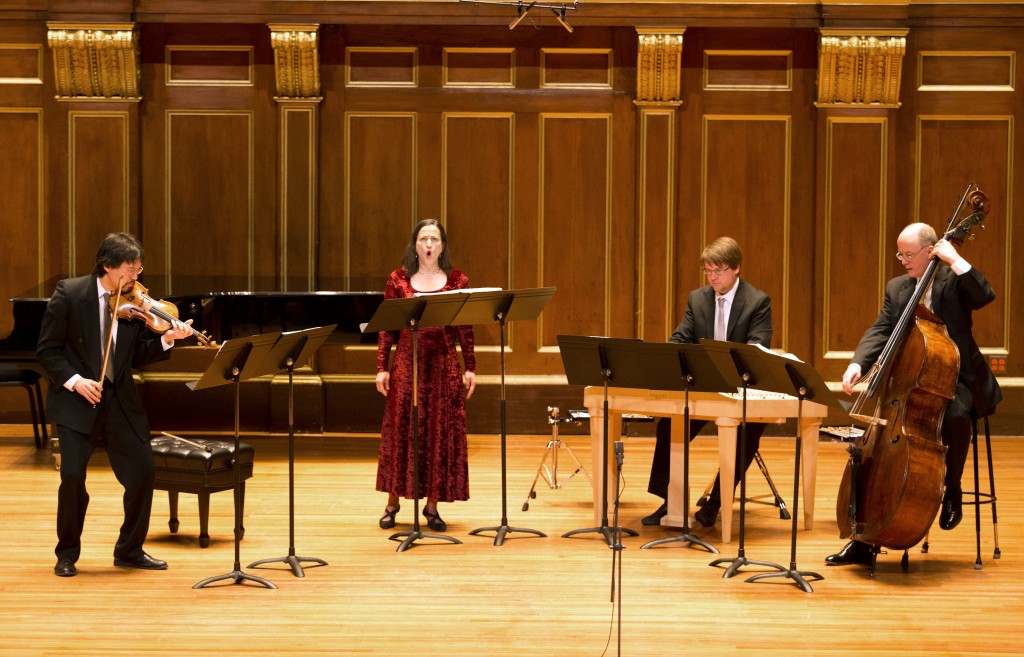Guests join Boston Symphony Chamber Players for music of Schumann and Kurtág

Christine Brandes performed Kurtag’s “Scenes from a Novel” with the Boston Symphony Chamber Players Sunday at Jordan Hall. Photo: Winslow Townson
Though separated by a century of musical development, the music of Robert Schumann and György Kurtág is more similar than one might think. Kurtág has long been an admirer of Schumann’s music, and his own chamber works reflect the same intricate voicing and intimate dialogue that marks the elder composer’s style. But beyond that, the works of both composers are imbued with a concentrated emotionalism. Only the musical language, the means with which the two achieved such emotions, is different.
Sunday afternoon at Jordan Hall, the Boston Symphony Chamber Players offered colorful and bracing performances of works by the two composers.
The centerpiece of the concert was Kurtág’s Scenes from a Novel, Op. 19. Scored for soprano and ensemble, the work, a setting of fifteen poems by Russian writer Rimma Dalos, is a haunting depiction of loneliness.
Kurtág’s music is both eerie and beautiful, and it effectively captures the raw emotions of the text. Some movements have a tart, biting sonority, which highlighted the naked realities of such lines as “From meeting to parting, from leave-taking to awaiting—that was my woman’s lot.” Grinding dissonances, too, capture the literal meaning of the some phrases, as in “so ragged and tattered, torn and frayed.” The seventh song, with its disjointed vocal statements, is underscored by driving Bartókian rhythms, while the “Epilogue,” a restatement of the “woman’s lot” poem, unfolds over haunting microtonal slides in the strings.
The Chamber Players performed the work with commitment and precision. Violinist Haldan Martinson and bassist Edwin Barker were in expert communication with each other and with the two guest musicians, soprano Christine Brandes and Nicholas Tolle, who supplied dutiful accompaniment on the cimbalom.
Brandes’ resonant, rose-colored voice well-suited the darkness portrayed in Kurtág’s songs. Her free-moving melody in the first of the set, “Come,” shimmered against the open harmonies of Martinson’s violin, the music freezing on prickly dissonances. And the feathery lines of the sixth, “Dream,” seemed to resonate in space.
The other work by Kurtág heard Sunday afternoon, the Wind Quintet, offered another example of the composer’s compressed romanticism.
With its atonal harmonic palette, pointillist textures, and colorful instrumentation, the Wind Quintet owes much to Webern’s example. The Chamber Players—flutist Elizabeth Rowe, oboist John Ferrillo, French hornist James Sommerville, bassoonist Richard Svoboda, and clarinetist William R. Hudgins—gave an alert reading that made much of the work’s delicate lines. The musicians handled the aggressive passages with authority and robust tone, and their playing of the music’s bare, patchwork textures was haunting in effect. Sommerville was in top form in this piece, supplying forceful attacks in the third movement and lofting an angular melody in the fourth with the warmth of an operatic aria.
The other works heard on the program also featured fine playing, thanks in no small part to the guest pianist. Emanuel Ax is the soloist for the Boston Symphony Orchestra’s concerts this weekend, and on Sunday he teamed up with the Chamber Players to perform three beloved works by Schumann.
The chief offering was the composer’s Piano Quintet in E-flat, which featured Ax and the musicians in a reading that was awash in bold colors. The second movement march unfolded in stark, detached utterances, led by violinist Malcolm Lowe in silvery tones. The Scherzo moved with fiery energy.
The ensemble found the crisp precision of the outer movements’ principal themes while taking the time to coax the soft lyricism from the song-like passages. Ax played with tasteful rubato, and the strings followed his lead, providing clear treatment of the sudden twists and turns of the score.
The concert opened with two works that Schumann composed in 1849. The first, the Fantasiestücke for clarinet and piano, Op. 73, featured William R. Hudgins and Ax in graceful dialogue, each handling the music’s swirling melodies with tender, cantabile tone.
Schumann’s Adagio and Allegro for French horn and piano, Op. 70, which followed, was a little skittish. James Sommerville’s tone had a nervous shake in its low register, though he was able to float warm phrases in his middle and upper range. Ax, throughout, proved to be a sensitive and feathery-toned accompanist.
Sunday was Malcolm Lowe’s birthday, and Ax led the audience in a spirited rendition of “Happy Birthday” as an encore.
The Boston Symphony Chamber Players will perform works by Françaix, Poulenc, and Fauré, with pianist Jean-Yves Thibaudet 3 p.m. April 26 at Jordan Hall. bso.org; 617-266-1492
Posted in Performances